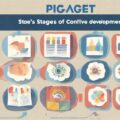Understanding the stages of human development is crucial in the field of psychology. It helps in comprehending how individuals evolve from infancy through adulthood. Each stage is characterized by different physical, cognitive, and emotional changes.
Infancy
Infancy, which spans from birth to around two years old, is a period of rapid growth and development. During this stage, infants gain motor skills, develop their senses, and begin to form emotional bonds with caregivers. Cognitive development is marked by the recognition of objects and the beginnings of language acquisition.
Early Childhood
Early childhood extends from ages two to six. This stage is characterized by significant advances in language and motor skills. Children start to assert their independence and begin to develop their sense of self. Social interactions with peers become more complex as they learn to play cooperatively and understand social norms.
Middle Childhood
Middle childhood, from ages six to twelve, is a time of steady growth and cognitive development. During this stage, children become more adept at logical thinking and problem-solving. They also develop a stronger sense of identity and self-esteem as they engage in more structured learning and extracurricular activities.
Adolescence
Adolescence, spanning from ages twelve to eighteen, is marked by puberty and rapid physical changes. This stage involves significant cognitive and emotional development. Teenagers strive for independence, form deeper relationships outside the family, and explore their identity. It’s a period of significant brain development, impacting decision-making and risk-taking behaviors.
Early Adulthood
Early adulthood, from ages eighteen to thirty-five, involves establishing personal and professional relationships, pursuing higher education or careers, and often starting families. Cognitive development continues, with individuals gaining more experience and wisdom. Emotional stability and the ability to manage relationships are key aspects of this stage.
Middle Adulthood
Middle adulthood, from ages thirty-five to sixty-five, is a period of reflection and reassessment. Individuals often evaluate their life achievements and set new goals. Physical changes such as decreased metabolism and the onset of age-related health issues may occur. Cognitive abilities may peak, allowing for complex problem-solving and creative thinking.
Late Adulthood
Late adulthood begins at age sixty-five and continues onward. This stage can involve significant physical changes, such as reduced mobility and sensory decline. Cognitive changes can also occur, with some experiencing memory loss or decreased cognitive function. However, many maintain high levels of cognitive activity and continue to lead fulfilling lives. Emotional well-being is often enhanced by strong social networks and a sense of accomplishment.
FAQ
What are the key stages of human development?
The key stages of human development include infancy, early childhood, middle childhood, adolescence, early adulthood, middle adulthood, and late adulthood.
Why is understanding human development important in psychology?
Understanding human development is important in psychology because it helps professionals understand how individuals grow and change throughout their lives, which can inform treatment and interventions.
How does cognitive development change across the stages?
Cognitive development evolves significantly across the stages, with early stages focusing on basic motor skills and language acquisition, and later stages involving complex problem-solving and abstract thinking.
What role do social interactions play in human development?
Social interactions are crucial at every stage of human development as they influence emotional and cognitive growth, help form identity, and establish social norms and relationships.
Are there any critical periods in human development?
Yes, certain stages like infancy and early childhood are considered critical periods where rapid development occurs, and any disruptions can have long-lasting effects.









